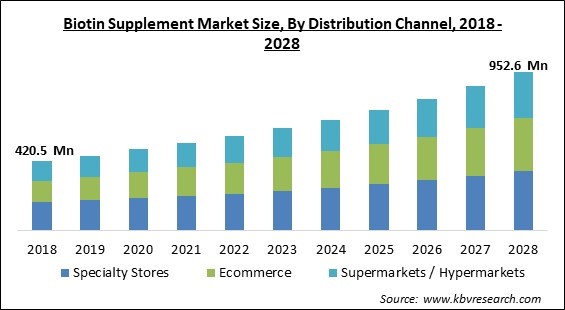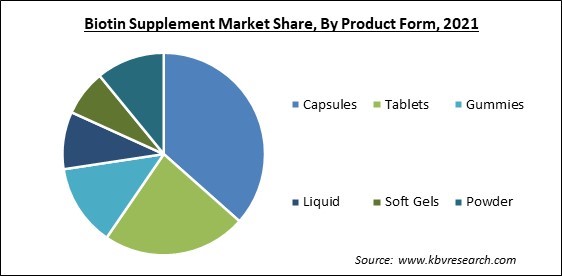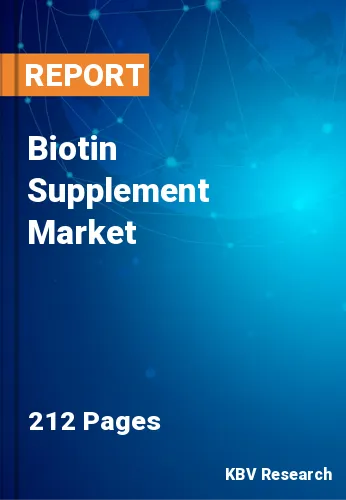The Global Biotin Supplement Market size is expected to reach $952.6 Million by 2028, rising at a market growth of 9.0% CAGR during the forecast period.
Biotin is one of the most required B vitamins and is also known as vitamin B7. This vitamin is utilized in a vast array of metabolic activities in humans and other creatures, especially pertaining to the consumption of carbohydrates, fatty acids, and amino acids. The US National Academy of Medicine revised Dietary Reference Intakes for a number of vitamins and the academy has established adequate intakes (AIs) of biotin for females and males.

Similarly, the European Food Safety Authority (EFSA) also detects AIs, establishing levels of 40 micrograms per day for adults, 40 micrograms per day during pregnancy, and 45 micrograms per day during lactation. The AIs for children aged 1 to 17 rise from 20 to 35 micrograms per day as they grow. B vitamin biotin is water-soluble, meaning that there is no maximum intake limit.
Large quantities consumed as a supplement are absorbed and the excess is excreted in the urine as biotin. Chronic alcohol consumption is related to a substantial decrease in plasma biotin. Intestinal biotin absorption appears to be susceptible to the effects of carbamazepine and primidone, two antiepileptic medications.
Biotin levels in the plasma or urine of patients with a partial gastrectomy or other origins of achlorhydria, burn victims, elderly adults, and athletes have also been observed to be relatively low. Pregnancy and breastfeeding may be connected with an increase in biotin requirement. This may be owing to a hypothesized augmentation of biotin catabolism during pregnancy.
During the COVID-19 pandemic, e-commerce was already in operation and experienced explosive growth as a distribution channel. This was due to the fact that customers avoided going to populated places and instead favored online sales channels because they offered the convenience of purchasing biotin supplements without having to leave their homes. During the pandemic, this led to an even greater spike in need for biotin supplements. Additionally, the growing popularity of online pharmacies among customers all over the world contributed to an increase in sales of biotin supplements in every region of the world.
Population growth is attributable to better healthcare options, decreased mortality rates, and consumer willingness to spend on health and wellness. This has provided the international nutraceutical industry with a much-needed boost. For example, according to a 2017 International Food Information Council (IFIC) study, more than two-thirds of U.S. adults consider food and beverage healthfulness when making purchases. In addition, the shift in consumer tastes toward functional meals has contributed to increased sales. The aforementioned reasons are anticipated to contribute to the market's steady expansion.
A multitude of causes, including the rise in acne, scars, black spots, dullness, and tanning, have contributed to an increase in the need for skin-nourishing food products. In addition, the younger generation has a greater demand for skin-brightening products, toners, and scrubs. In contrast, the elderly population increasingly needs wrinkle-relieving goods and cracked-heel treatments. All of these problems are effectively managed by biotin. It is projected that changing consumer purchasing patterns and lifestyles will contribute to the overall rise of the industry.

As many foods contain biotin, a rise in the desire for organic foods could hinder the expansion of the industry. Biotin can be obtained by consuming a range of foods, such as fish, eggs, meat, organ meats (like liver), seeds, as well as nuts. According to a report by the Office of Dietary Supplements of the National Institutes of Health, biotin is a vital vitamin that occurs naturally in various foods; therefore, a person who consumes food does not need biotin supplements. Biotin is abundant in animal-based protein sources such as chicken liver, salmon, beef liver, and eggs. These factors are ultimately serving as a market-restraining influence.
Based on distribution channel, the biotin supplement market is categorized into supermarkets/hypermarkets, specialty store, and e-commerce. The specialty stores segment garnered the highest revenue share in the biotin supplement market in 2021. Biotin supplements can be easily bought from any specialty stores, like drugstore or beauty salons or even convenience stores. Most biotin supplement selling specialty stores usually sell products other supplements and health food and beverages as well. Low product prices, discounts, shopping ease, and a vast product selection are anticipated to assist in the continuing growth of the segment.
On the basis of application, the biotin supplement market is divided into nail-care, pharmaceutical, skin-care, and hair-care. The hair-care segment acquired the largest revenue share in the biotin supplement market in 2021. Changing fashion preferences and growing awareness of providing better, more efficient, and safer products for hair care have contributed to the segment's rise. Biotin increases the production of keratin in hair and can accelerate follicle growth. Many consumers believe that by consuming vitamin B7 daily, a person may promote the health of their hair, strengthen it, and add shine. Biotin also prevents various health issues, such as hair loss, dandruff, and itchy scalp.
Based on product form, the biotin supplement market is segmented into capsules, tablets, soft gels, liquid, gummies, and powders. The powders segment garnered a remarkable growth rate in the biotin supplement market in 2021. Companies in the supplement industry are investing in the creation of energy solutions for health and well-being. The rise of the powder segment is attributable to people's increased demand for energy-mix powders. In addition, makers of dietary supplements like Amway have incorporated powder forms of biotin into many of their most demanded products, like NUTRILITE, which can be blended with beverages and dairy products.
| Report Attribute | Details |
|---|---|
| Market size value in 2021 | USD 528.3 Million |
| Market size forecast in 2028 | USD 952.6 Million |
| Base Year | 2021 |
| Historical Period | 2018 to 2020 |
| Forecast Period | 2022 to 2028 |
| Revenue Growth Rate | CAGR of 9% from 2022 to 2028 |
| Number of Pages | 212 |
| Number of Table | 390 |
| Report coverage | Market Trends, Revenue Estimation and Forecast, Segmentation Analysis, Regional and Country Breakdown, Companies Strategic Developments, Company Profiling |
| Segments covered | Product Form, Distribution Channel, Application, Region |
| Country scope | US, Canada, Mexico, Germany, UK, France, Russia, Spain, Italy, China, Japan, India, South Korea, Singapore, Malaysia, Brazil, Argentina, UAE, Saudi Arabia, South Africa, Nigeria |
| Growth Drivers |
|
| Restraints |
|
On the basis of region, the biotin supplement market is analyzed across North America, Europe, Asia Pacific, and LAMEA. The Asia Pacific segment acquired the highest revenue share in the biotin supplement market in 2021. Due to China's vast output, the Asia-Pacific region has the largest market share in the biotin industry. Zhejiang Medicine Company is rumored to be the largest biotin manufacturer in the world. In China and India, numerous manufacturers produce biotin supplements. As a result, trade has increased between East and South Asia as well as other regions. In addition, the region has been experiencing increased consumer spending on health supplements due to biotin's health benefits.
Free Valuable Insights: Global Biotin Supplement Market size to reach USD 952.6 Million by 2028
The market research report covers the analysis of key stake holders of the market. Key companies profiled in the report include Church & Dwight Co., Inc., Nestle S.A., Nutraceutical Corporation, Life Extension Foundation Buyers Club, Inc., The Nature’s Bounty Co. (Kohlberg Kravis Roberts & Co. L.P.), Zhou Nutrition LLC (Nutraceutical International Corporation), NOW Foods, Inc., Vytalogy Wellness, L.L.C. (New Mountain Capital, LLC), Doctor's Best, Inc. (Xiamen Kingdomway Group), and Designs for Health, Inc.
By Distribution Channel
By Product Form
By Application
By Geography
The global Biotin Supplement Market size is expected to reach $952.6 Million by 2028.
Increasing sensitivity to personal grooming across all age groups are driving the market in coming years, however, Easy availability of biotin in organic foods restraints the growth of the market.
Church & Dwight Co., Inc., Nestle S.A., Nutraceutical Corporation, Life Extension Foundation Buyers Club, Inc., The Nature’s Bounty Co. (Kohlberg Kravis Roberts & Co. L.P.), Zhou Nutrition LLC (Nutraceutical International Corporation), NOW Foods, Inc., Vytalogy Wellness, L.L.C. (New Mountain Capital, LLC), Doctor's Best, Inc. (Xiamen Kingdomway Group), and Designs for Health, Inc.
The Capsules segment acquired maximum revenue share in the Global Biotin Supplement Market by Product Form in 2021 thereby, achieving a market value of $332.1 million by 2028.
The Asia Pacific market dominated the Global Biotin Supplement Market by Region in 2021, and would continue to be a dominant market till 2028; thereby, achieving a market value of $360.4 million by 2028.
Our team of dedicated experts can provide you with attractive expansion opportunities for your business.

